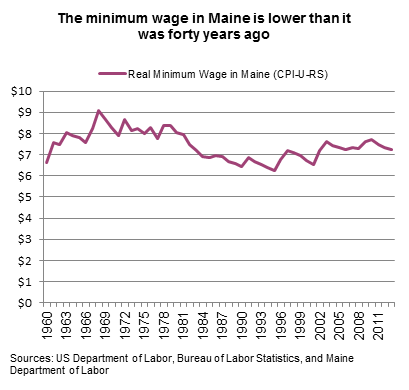“An increase in Maine’s minimum wage is long overdue. Adjusted for inflation, the minimum wage in Maine is lower than it was forty years ago. Wages for low-income working families in general have barely grown at all in thirty years, after accounting for the purchasing power of the dollars they earn . . . LD 843 would be good for Maine’s workers and good for Maine’s economy. We urge you to pass this bill.”
for a PDF of this testimony, click here.
Good afternoon Senator Volk, Representative Herbig, and distinguished members of the Joint Standing Committee Labor, Commerce, Research, and Economic Development. I’m Joel Johnson. I’m an economist at the Maine Center for Economic Policy. I’m here today to testify in favor of LD 843.
 The minimum wage is a labor standard. It was established in the Fair Labor Standards Act of 1938 in the wake of the Great Depression. It places a floor under the price of labor, limiting downward pressure on wages. The labor market is perhaps the most important market in our economy because it determines the standard of living and quality of life for our citizens. That’s why we have labor standards.
The minimum wage is a labor standard. It was established in the Fair Labor Standards Act of 1938 in the wake of the Great Depression. It places a floor under the price of labor, limiting downward pressure on wages. The labor market is perhaps the most important market in our economy because it determines the standard of living and quality of life for our citizens. That’s why we have labor standards.
Increasing the minimum wage and indexing it to rise automatically with the wages of workers across the country will reward hard-working Mainers and help Maine’s economy by putting more money in the pockets of those who are most likely to spend it locally.
An increase in Maine’s minimum wage is long overdue. Adjusted for inflation, the minimum wage in Maine is lower than it was forty years ago. Wages for low-income working families in general have barely grown at all in thirty years, after accounting for the purchasing power of the dollars they earn.
Thanks to analysis of US Census Bureau Current Population Survey data by the Economic Policy Institute (EPI), we have good estimates of how many workers an increase in the minimum wage in LD 843 would directly affect. Gradually increasing the minimum wage to $12.00 per hour by 2019 would give over 120,000 Maine workers—more than a fifth of the state’s workforce—a raise.
According to EPI, here are some of the characteristics of workers who would be directly affected by an increase in the minimum wage to $12 by 2019:
- 60% of the workers who an increase in the minimum wage to $12 dollars an hour would directly affect are women.
- 85% are over the age of 20.
- 75% work in service, sales, and office and administrative support occupations.
- 75% work in three major industries: retail, education and health services, and leisure and hospitality.
- 40,000 Maine children have at least one parent who would get a raise from this legislation.
We know from academic research that increases in a working parent’s income can have long-lasting impacts on the lives of their children, leading to more work effort and greater earnings as an adult.
Indexing the minimum wage is important to ensure that the effectiveness of this labor standard doesn’t erode over time and allow downward wage pressure to hurt American workers. By indexing the minimum wage to the national average wage, LD 843 would ensure that the improvement in the standard of living of minimum wage workers keeps pace with the their co-workers in the middle of the wage distribution spectrum.
Finally, I want to address the persistent myth that the minimum wage increases unemployment. The employment effect of the minimum wage is one of the most studied topics in all of economics and the bulk of the evidence is clear: modest increases in the minimum wage have very little or no effect on unemployment. This is all well-documented in a recent review of the literature by Jon Schmitt, an economist at the Center for Economic and Policy Research. Most notably, Schmitt points to two recent “meta-analyses” that summarize the findings of dozens of academic studies that tested for disemployment effects of minimum wage increases.
We at the Maine Center for Economic Policy are confident that LD 843 would be good for Maine’s workers and good for Maine’s economy. We urge you to pass this bill.



